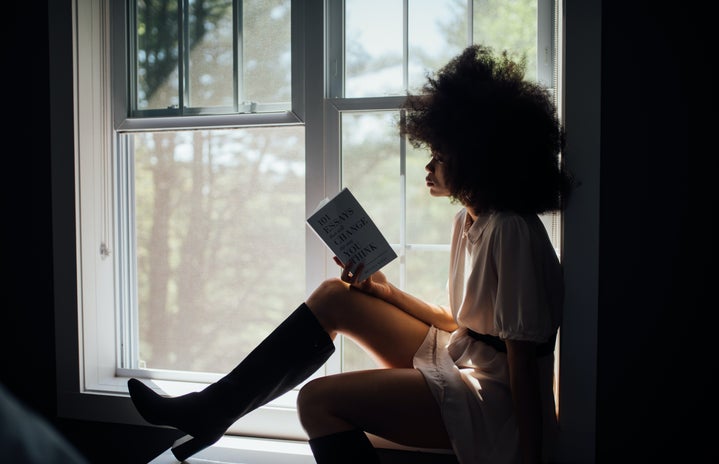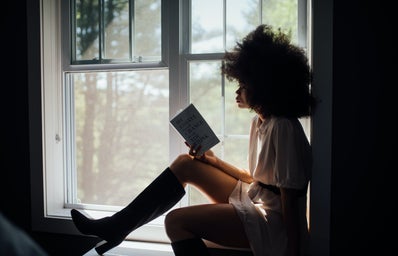If you’ve read my Her Campus bio, then you’d know I am a proud yet chronic re-reader and have been since I read the Hunger Games trilogy five times front to back in middle school—a phase for which I will not be offering an explanation. I love rereading because I get to take off the pressure of reading to understand the plot, and can instead allow myself to read with a more critical literary eye—spoken like a true English nerd. I have re-read multiple passages, if not the entirety, of all five books that I highlight below, because of their powerful underlying themes and implications, especially in relation to female identity. As we come off a summer chalk full of uninhibited celebrations of womanhood, these books are the perfect way to continue engaging with female-centered media that inspires us to think more about what exactly it means to be a woman.
- beautiful world, where are you – sally rooney
-
In the last two years, Sally Rooney has become my favorite author. Over the summer I had the chance to reread her most recent novel. I know this statement will be controversial to the Normal People stans, a demographic in which I include myself, but I think Beautiful World is her best yet because of the defining presence of female introspection.
While Rooney deftly explores and exposes the trials and tribulations of romantic relationships in all three of her novels, in her latest, she explores intimacy through the lens of two female protagonists, rather than a male and a female. Rooney centralizes the female perspective through Eileen and Alice’s epistolary relationship, in which they discuss the ennui of modern life, from commercial capitalism to what they deem to be superficial forms of beauty. In typical Rooney fashion, her two leading ladies struggle to come to terms with who they are and how they fit into the complicated and frankly messed-up world around them. However, rather than submitting to their frequent existential dread, they realize that what we often deem trivial in the grand scheme of things, like platonic and romantic relationships, are actually what reveal the most beauty to us within this world.
- my year of rest and relaxation – Ottessa Moshfegh
-
We’ve feared it, we’ve felt it and we’ve tried time and time again to snuff it out: female rage. The unnamed heroine of Ottessa Moshfegh’s bestselling novel, My Year of Rest and Relaxation, has mastered the guise of being an absolutely insufferable and unlikable female lead. To a casual onlooker she is as beautiful as she is vain and as cultured as she is tortured, but in reality, she is simply miserable. Despite being essentially plotless, this novel weaves pockets of profound thought into a story about a young woman’s planning and execution of a drug-induced hibernation. She views her months in hibernation as an almost non-religious and extended baptism, as she hopes that it will wash her clean of her distaste for living and allow her to re-emerge as a new person.
What is most impressive to me about this book is how Moshfegh was able to personify the literary concept of an “unsympathetic character” but in the form of a young, beautiful and well-educated female protagonist. While we never really find ourselves rooting for her, there is a consistent level of relatability to her character that makes us question how we arrive and why we arrive at deeming characters, especially female characters, unlikable.
- the awakening – kate chopin
-
To go along with the theme of re-reading, I pick up The Awakening every few months to read a chapter or two as it is one of the most subversive feminist texts I have ever read. Not only is the novel remarkable due to the nature of the female protagonist’s storyline, but also because of its author. Kate Chopin chose to publish The Awakening despite its inherent controversy, which essentially resulted in an end to her literary career. The novel follows the liberating yet tragic story of Edna Pontellier, a young wife and mother crushed by the weight of domesticity in the Creole South at the end of the 19th century. After undergoing a spiritual awakening sparked by her extramarital affair, Edna’s newfound individualism and desire for self-determination broke the societal mold that once trapped her inside the world of motherhood and wifehood.
Every time I come back to it, I am blown away by the fact that a book published over 120 years ago retains such a tangible sense of modernity. As a young woman who has always questioned the role that I want motherhood and domesticity to play within my own future, Edna’s story of pushing against the bounds that restricted her individual freedom will always resonate very closely with me.
“I would give up the unessential; I would give my money, I would give my life for my children; but I wouldn’t give myself. I can’t make it more clear; it’s only something which I am beginning to comprehend, which is revealing itself to me.” – Kate Chopin - my body – emily ratajkowski
-
Before reading My Body, I didn’t know much about Emily Ratajkowski beyond her expertly curated online presence as a world-renowned model and her luxury swimwear brand, Inamorata. In her New York Times Bestseller, EmRata invites her readers to learn about her life through a completely new lens, an honest lens dead-set on capturing her experience of womanhood in the public eye. She approaches her essays with an unapologetic tone, one that simultaneously exposes the power of capitalizing off of the world’s fetishization of female beauty and the inherent lack thereof.
One of the most compelling aspects of the book is how effortlessly relatable it is; the anecdote that struck me the most was a conversation between Emily and a friend in response to Halle Berry saying that her looks have never spared her any hardship. Initially frustrated by Berry’s assertion, they quickly found themselves guilty of placing her on a pedestal for her beauty, one that contributed to the erasure of her experience as a woman navigating a patriarchal culture obsessed with critiquing the way women look. Emily and her friend ultimately assert that they too fall for the mindset that our lives would be easier if only we could make ourselves more attractive to men, a mindset that every woman buys into at least once in their lived experience.
- bad feminist – roxane gay
-
If I had to choose one word to describe Bad Feminist, it would be forgiveness. Just as no person can be perfect and no woman can be perfect, Roxane Gay reminds us that the same applies to feminists; she makes it clear that no feminist is or will ever be perfect, and in her eyes, that is perfectly okay.
Through her collection of essays and personal anecdotes, one of the central points that she gets across is that just because the individuals who support the feminist movement are flawed and will make mistakes, does not mean that the movement itself is flawed. The pressure we exert upon women to be flawless feminists can be so overwhelming that it dissuades others from accepting the same label, for fear that their actions will be subject to the same level of intense criticism that the movement is consistently exposed to. She reminds us that it is better to be a bad feminist, one who makes mistakes and doesn’t always follow the script, than to not be one at all. As bad feminists, we give ourselves grace when watching a chick-flick that doesn’t pass the Bechdel test and when listening to rap music at the gym. We accept that the way we go about supporting what we believe in does not change the fact that women deserve to be treated equitably.
My passion for re-reading books has always shaped my deep appreciation for the power of storytelling. The experience of revisiting familiar narratives, like the Hunger Games trilogy, goes beyond mere nostalgia; it allows me to delve deeper into the nuances of the text and explore the underlying themes that resonate with me, particularly those related to female identity. So, as we turn the pages of these books once more, let’s continue our journey of exploration and empowerment, reminded that the power of literature lies not only in its ability to entertain but in its capacity to enlighten and inspire.


